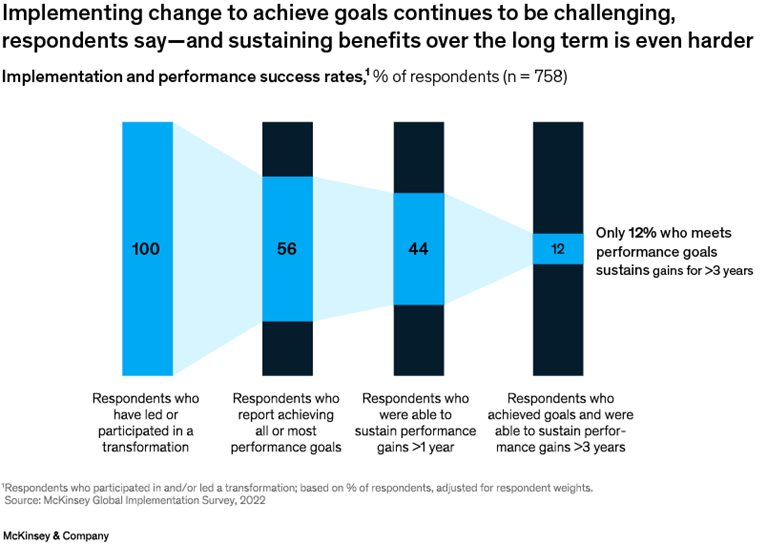Making change stick: overcoming five pitfalls of organisational change
Our research at Orphoz has found that change is essential for organisations to stay competitive, as they face pressures from new technologies, evolving customer needs, or economic uncertainty. Yet, while many UK organisations recognise the need for change, achieving all their goals– and making the results sustainable over time – remain a significant challenge.
According to our recent survey of more than 750 executives worldwide, only 56 percent of business leaders who have led or participated in a transformation in the past five years say their companies’ transformation programmes were able to accomplish most or all of their performance goals – at least initially. And only 12 percent said their organisations sustained any performance gains for more than three years.

The key to achieving long-lasting change is bridging the gap between strategy and execution - and avoiding the pitfalls that commonly scupper attempts at major change. But what are the most common challenges UK business leaders are facing? And how do you go about addressing them?
1. Ensuring change delivers tangible and sustainable impact
One of the most common dilemmas we see in the UK market is how to translate strategic ambitions into measurable outcomes. Many organisations launch change programmes with bold aspirations but lack the mechanisms to track progress and sustain impact. This is particularly true in sectors like retail, manufacturing, and healthcare, where margins are tight, and the pressure to deliver quick wins is high.
Embedding a robust performance management system from the outset is essential - this ensures transformation efforts deliver tangible financial results where applicable. By breaking down transformation goals into clear, actionable initiatives and establishing a cadence of regular reviews, businesses can ensure progress is both measurable and sustainable.
Through the setup and management of a central programme management office - whether it is a Transformation Office (TO) to drive organisational transformation, or a Value Creation Office (VCO) to focus on achieving rapid and measurable value improvement (for example, for private equity portfolio companies), or a Post-Integration Management Office (IMO) to identify, capture and execute synergies from the merger or acquisition (M&A) - the structure and discipline needed to maintain momentum and course-correct when necessary is achieved. TO, VCO or IMO act as the nerve centre of the transformation, providing structure, discipline, and transparency to drive bottom-line impact. This tracks initiative progress, manages governance, and ensures alignment with strategic objectives. With this structure, progress is both sustainable and measurable, directly boosting EBITDA and enhancing Enterprise Value (EV).
2. Aligning leadership and building organisational buy-in
Change programmes often lose momentum due to misaligned leadership or a lack of stakeholder commitment. In the UK, many organisations including private equity (PE) backed businesses have governance structures that complicate decision-making. Additionally, stakeholder engagement is not embedded into the plan, which hinders bringing the workforce with you on new ways of working.
Successful change requires more than just top-down directives - it demands active engagement throughout the organisation. Fostering a culture of co-creation empowers employees to take ownership of change and contribute practical, innovative ideas. We frequently work with leadership teams to align on a shared vision—before helping them cascade this throughout the organisation; from everything we have seen, gaining the buy-in from all levels of an organisation is as essential for long-term success as any processes or structures that are also set up as part of a transformation.
3. Bridging the talent and capability gap
Although the success of any change programme depends on the leaders driving it, many businesses face a talent gap. This challenge is compounded by the need to upskill existing employees while attracting new talent in a competitive market.
The most successful approach is often to build change capabilities from within: upskilling employees through targeted training programs, coaching, and on-the-job learning. This embeds new capabilities into the organisation so that the benefits are sustained over time, as well as creating personal growth opportunities and resilience across the workforce.
4. Overcoming the "pilot trap" to scale change efforts
Many UK businesses excel at piloting new initiatives but struggle to scale them across the organisation. This ‘pilot trap’ often stems from a lack of dedicated resources, unclear ownership, or insufficient focus on scaling capabilities.
Scaling change requires a deliberate and structured approach - to move beyond initial pilots by building the capabilities needed to scale. This includes defining clear roles and responsibilities, developing repeatable processes, and leveraging technology to enable scalability. Organisations need to work in an agile way, to ensure that scaling efforts remain flexible and responsive to changing needs. Again, involving people across the organisation is a key factor of success. This includes those receiving the change, as well as those delivering it.
5. Navigating external disruptions and industry-specific challenges
The external environment often increases the complexity of delivering change. This may include regulatory uncertainty, economic volatility, supply chain shifts, or changes to trade policy and tariffs. In addition, almost every industry faces a more challenging operational landscape than in the pre-pandemic era – especially given the added disruptions of AI, and companies decide to rewire how they run.
Resilience and adaptability are the essential ingredients. Businesses should aim at building these muscles into their change strategies by conducting scenario planning, stress testing initiatives, and identifying risks and opportunities early. Industry-specific expertise should inform each step, from initial analysis through to the sequencing of the change initiatives.
Addressing performance issues while seeking new ways to capture opportunities continue to be top of mind for many UK business leaders, especially at a time of rapid change across industries. But while transforming an organisation is never straightforward, this analysis of the common challenges shows that with the right approach, businesses can turn them into opportunities for growth, innovation, and resilience.
Orphoz, a McKinsey company, works side-by-side with clients to drive lasting impact and value through rigorous project management, change management, capability building, and coaching. Find out more at orphoz.com.
